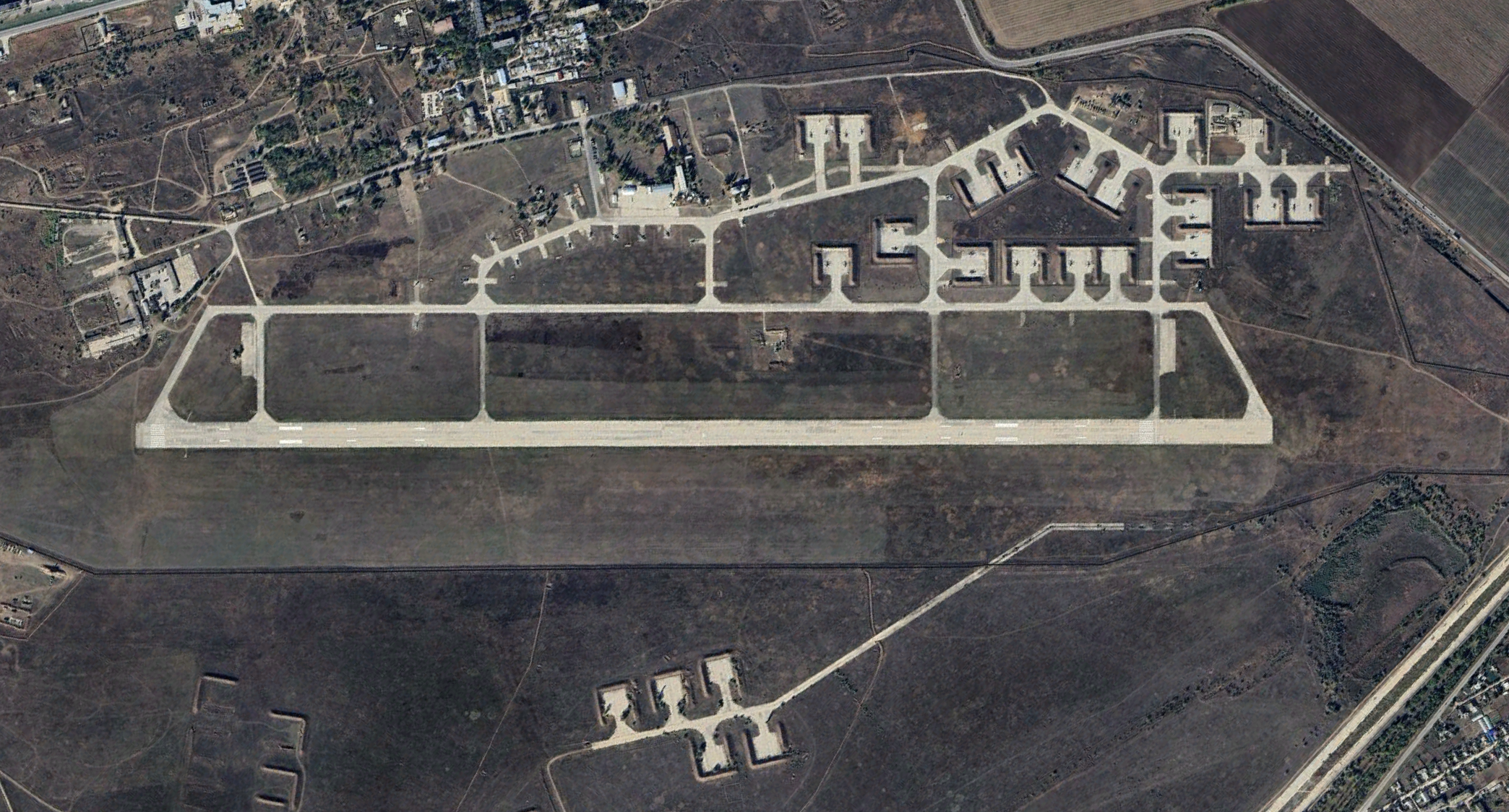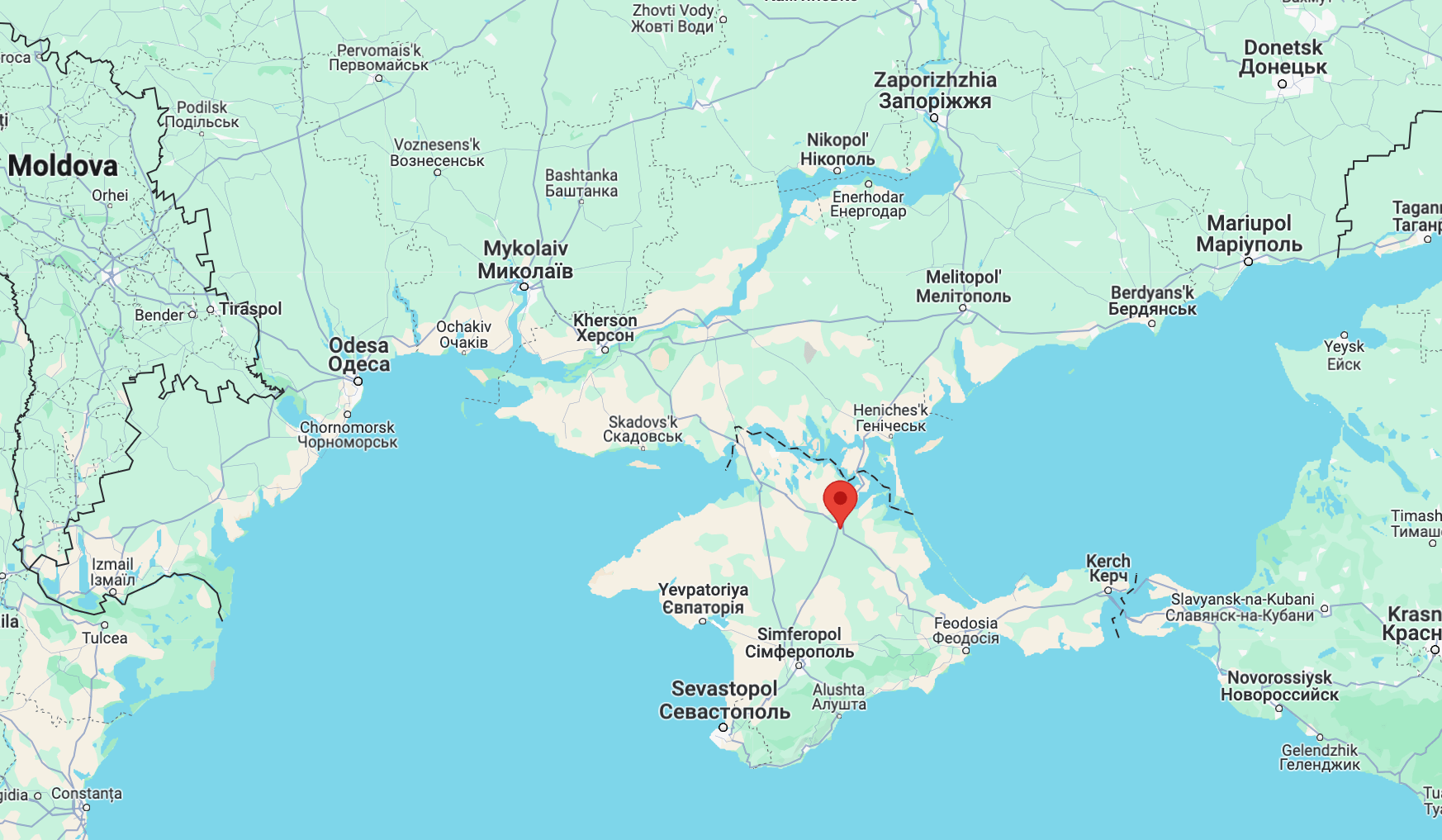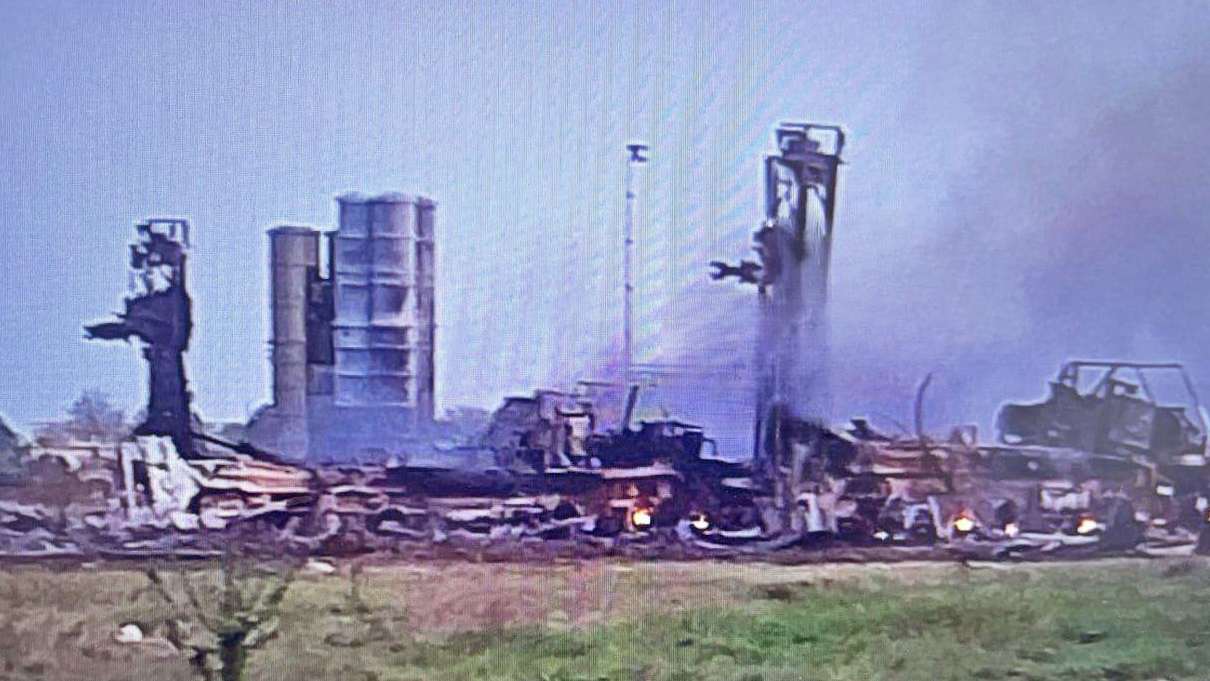Multiple reports, photos, and videos, as well as satellite sensor imagery, suggest that Ukrainian forces struck the Russian airbase at Dzhankoi, in the northern part of occupied Crimea, overnight. Reportedly, the attack — which most sources suggest involved a ballistic missile strike — led to the damage or destruction of several of Russia’s prized S-400 and S-300 air defense systems, and potentially more.

As well as descriptions of powerful explosions in the area, and secondary explosions up to five hours after the attack, the Fire Information for Resource Management System (FIRMS), which provides near real-time active fire data via orbital infrared sensing, indicates at least six blazes around the airbase.
Ukrainian channels have not surprisingly heralded the attack as a success, claiming that between three and five S-400 and S-300 systems were hit. An account on the ZSU-War Telegram channel claims that a first wave of missiles targeted the S-400 system, destroying three launchers and a radar unit. Once the air defenses had been softened up, a subsequent wave is then said to have destroyed the repair and maintenance hub at the base. A photo that purports to show the aftermath of the attack suggests that at least three transporter-erector-launchers (TELs) associated with the S-400 and/or S-300 systems were at least damaged.
Claims from the Russian side suggest that as many as a dozen ballistic missiles were launched against the airbase and that up to 22 personnel may now be missing. Meanwhile, the pro-Ukrainian Crimean Wind Telegram channel reports that up to 30 Russian personnel may have been killed and another 80 injured.
Some Russian accounts — including the Russian military blogger Rybar — claim that Ukrainian forces attacked the airbase using its U.S.-supplied MGM-140 Army Tactical Missile System (ATACMS). While at least one photo purports to show debris from one of the weapons used in the attack, it’s not possible to confirm its identity.
As well as the air defense systems, Russian accounts claim that a facility used for the repair and overhaul of military equipment was also hit.
Located around 90 miles from the front lines, Dzhankoi has played an important role since Russia launched its full-scale invasion of Ukraine, not only as a logistics hub and repair facility but also as an active airbase. As of last month, the base was home to around a dozen attack helicopters, both Ka-52 Hokum and Mi-28 Havoc types, as well as four Su-25 Frogfoot ground-attack jets. It’s unclear at this stage if any of the aircraft at the base were also struck.
Today, there were unconfirmed reports that Russia was relocating helicopters from Dzhankoi to the airbase at Kirovski in the east of Crimea.

Natalia Humeniuk, a spokesperson for the Ukrainian Armed Forces in the south of the country, described Dzhankoi as a legitimate military target, according to a report in Newsweek, but offered no further details.
“It is clear that this is a military airfield, that is, a legitimate target,” Humeniuk said, in comments to the Ukrainian media. She added that Russia frequently moves military equipment to protect it from attack, but that “not all maneuvers were successful.”

Russian military infrastructure in and around Dzhankoi has been attacked on several occasions before as part of a much wider campaign targeting various Russian facilities in Crimea.
Among the targets that Ukrainian forces have repeatedly struck in Crimea, the S-400 is prominent, a sign of the critical role it plays in defending the peninsula, as well as threatening Ukrainian aircraft and drones over a much wider area, including over the front lines and parts of the Black Sea.
Before diving into more developments from the conflict in Ukraine, The War Zone readers can review our previous coverage here.
The Latest
The chief of Ukraine’s Main Directorate of Intelligence, or GUR, Kyrylo Budanov, has said that he expects Russia to launch its next major offensive at the end of May or the beginning of June. “I believe we will be well-prepared for this eventuality,” Budanov said, in comments reported by The Kyiv Post today. “However, our success will heavily depend on the support of our Western allies. Without their assistance, the situation will be extremely challenging for us,” the intelligence chief admitted.
Among the challenges that Ukraine will face in any future Russian offensive is the increasing use of highly mobile and agile forces, carried into battle and penetrating behind Ukrainian lines using all-terrain buggies as well as motorcycles. These tactics are a product of Russia’s ever-evolving battlefield doctrine, which has oscillated between relying on heavier armored formations and mightier and more mobile infantry units, as the situation dictates.
The video below shows a Russian assault group from the 123rd Motorized Rifle Brigade’s “Zarya” Battalion, using motorcycles as part of assaults that reportedly took place on the Siversk front, in the Donetsk region of eastern Ukraine. In particular, it’s noted that the motorcycles allow rapid assaults to be launched on enemy trenches, providing little warning to the defenders. Russian troops are also reportedly launching such assaults in close coordination with artillery and FPV drones.
As to the general situation on the battlefield now, there has been a grim assessment from Ukraine’s Col. Gen. Oleksandr Syrskyi, the chief of the Ukrainian Armed Forces. In a recent interview, Syrskyi stated that Russia has intensified its armored assaults in the fighting around Bakhmut. The result is that the situation on the eastern front has “deteriorated significantly,” in his words.
Speaking in his evening address, Ukrainian President Volodymyr Zelensky echoed the army chief’s words, explaining that the “situation at the front, in some areas, is difficult”.
With no end in sight for the Russian strikes that continue to pummel Ukraine, and especially its energy infrastructure, President Zelensky has called upon the United States and NATO allies to protect Ukraine in the same way that some of Israel’s allies did when that country recently came under an unprecedented Iranian drones and missile attack. “Terror must be defeated completely and everywhere, not more in some places and less in others,” the Ukrainian president said.
The Ukrainian leader also claimed that Russia was able to press home its attack on the coal-fired Trypilska Thermal Power Plant near Kyiv because Ukrainian air defenses in the area entirely ran out of the required surface-to-air missiles. The power plant, the largest operational one in the region in terms of power-generating capacity, was reportedly completely destroyed in the missile and drone attack, which you can read more about here.
Today, Ukraine was left counting the costs of a Russian attack on Chernihiv, a city in northern Ukraine. Zelensky again pointed to the lack of air defense equipment after strikes that killed at least 11 and injured at least 22 people, according to Minister of Foreign Affairs of Ukraine, Dmytro Kuleba.
“This would not have happened if Ukraine had received sufficient air defense equipment and if the world’s determination to resist Russian terror had been sufficient,” Zelensky said in a social media post on X. “The Ukrainian determination is sufficient. There must be equally sufficient determination from our partners and, as a result, sufficient support,” Zelensky added.
Aside from the urgent need for additional air defense equipment, Zelensky reiterated Ukraine’s requirement for more weapons to help keep up the pressure against Russian forces on the front lines. Comparing the mismatch in numbers between Ukraine and Russia, Zelensky said: “Today, artillery on the front is one to 10 [in favor of Russia], aircraft are one to 30. With such statistics, the Russian Federation will push us back every day.”
There may be some new hope ahead for Ukraine, however, with reports emerging today that a vote will be held on Saturday to determine whether or not to relaunch U.S. military aid to Ukraine, as well as to Israel.
“We expect the vote on final passage on these bills to be on Saturday evening,” the Republican leader in the House of Representatives, Mike Johnson, announced today.
In one of its recent analyses of the conflict in Ukraine, the Institute for the Study of War (ISW), a U.S. think tank, warns that the ongoing debate in the United States about additional military assistance to Ukraine is based on a false premise. Namely, that not providing more arms at this point will result in a stalemate in the fighting. In fact, the ISW contends, “Russian advances will accelerate absent urgent American action.”
“The Russians are breaking out of positional warfare and beginning to restore maneuver to the battlefield because of the delays in the provision of U.S. military assistance to Ukraine,” the ISW adds.
Some of those predictions have been put forward also by U.S. Secretary of Defense Lloyd Austin, who told lawmakers today: “In terms of, you know, what happens going forward and how long Ukraine will be able to sustain its efforts, I think we’re already seeing things on the battlefield begin to shift a bit in in terms of in Russia’s favor. We are seeing them make incremental gains, we’re seeing the Ukrainians be challenged in terms of holding the line — they’re doing a very good job, a credible job — but in order to continue to do that, they’re going to need you know, the right materials, the right munitions, the weapons to be able to do that.”
A video has emerged providing us with a better look at the bizarre Russian ‘turtle tank,’ which features a shed-like metal construction to help protect against drone attacks, and which we recently profiled. The video shows the highly extemporized nature of the armored carapace, seemingly fabricated from whatever sheet metal was to hand, including corrugated tin. It also provides good details of the omni-directional counter-drone electronic warfare jammer mounted on top. The fact that at least three of these modified vehicles have recently appeared on the battlefield suggests that they have been found to offer at least some useful protection, despite their lumbering appearance.
The Ukrainian Armed Forces’ U.S.-supplied M1126 Stryker has received mesh-like defensive screens to help protect against incoming rocket-propelled grenades and other similar projectiles. The pictured Stryker, operated by the 82nd Air Assault Brigade, is also seen in a recent video festooned with camouflage, but without top-mounted anti-drone screens.
As for the 82nd Brigade, this has been described in the past as one of Ukraine’s “more elite infantry units,” and has seen considerable action in the fight for the village of Robotyne in the western Zaporizhzhia region.
Ukraine has reportedly had success in targeting a valuable Russian Nebo-U long-range radar system, located in the Bryansk region that borders Ukraine. The system, which had apparently been modernized, was hit by as many as seven drones in an operation organized by the Security Service of Ukraine, or SBU.
The attack on the Nebo-U system — valued at around $100 million — was confirmed to the Kyiv Independent yesterday, by sources within the SBU. The radar reportedly provided coverage extending more than 430 miles into Ukraine. Codenamed ‘Tall Rack’ by NATO, the trailered system uses a phased array antenna and is also claimed to be effective against low-observability targets.
A Russian military headquarters, located in occupied Luhansk, eastern Ukraine, was reportedly also another recent victim of an airstrike. According to Sky News, which cited an unnamed military source, the HQ was struck by U.K.-supplied Storm Shadow cruise missiles, launched by Ukrainian Air Force Su-24 Fencer strike aircraft.
The attack, which reportedly took place last weekend, was a “heavy blow” for the Russian Armed Forces, the source said.
“This strike furthers Ukraine’s campaign to liberate the Luhansk region from the Russian Federation’s illegal invasion and ensure that Russia is not able to advance further into Ukraine,” the source added.
Looking further ahead, there are more signs that Ukraine could receive unspecified long-range strike capabilities for its long-awaited F-16 fighters, the first of which may well arrive in the country before the end of this year.
During a recent briefing in Kyiv, Norwegian Foreign Minister Espen Barth Eide explained:
“We will transfer Norwegian F-16s, which are updated and in good shape. Together with our Danish and Dutch colleagues, we are training Ukrainian pilots. Perhaps there will be even longer-range strike capabilities, which are very important for Ukraine now.”
It isn’t clear what this weapon would be. Norway itself does not have anything that would suit that bill, although their F-16s do carry Penguin anti-ship missiles.
In the meantime, the Ukrainian Air Force continues to rely on Soviet-era combat jets, including the Su-25 Frogfoot attack aircraft seen below. This example is armed with a varied weapons load, including U.S.-supplied 5-inch Zuni rockets loaded in an LAU-10 rocket pod, Soviet-era 122mm S-13 rockets in a B-13L rocket pod, as well as an R-60M (AA-8 Aphid) air-to-air missile. The heat-seeking R-60M missile is only very rarely seen in Ukrainian service and air-to-air armament is particularly unusual on the Su-25. This might indicate the use of this Cold War-era weapon to bring down Russian drones.
Looking more like a Hollywood prop than a viable fighting asset, the Kronos submersible vehicle has made another appearance, this time in Ukraine, gaining a lot of media coverage in the process.
The design was originally developed as a joint venture between companies in the United Arab Emirates and the United Kingdom but seems to have now migrated to Ukraine. According to a report in The Kyiv Post, Ukrainian engineers plan to arm the submersible with ‘torpedo missiles,’ with claims that the vessel has already been successfully tested for possible military use. Adding any kind of torpedo armament would seem to be a challenge based on the relatively small size of the craft, which was originally intended to carry a maximum of 10 passengers and crew.
We end the latest Ukraine Situation Report with some more noteworthy examples of hobbyist-style drones in use in the conflict, including the now-ubiquitous FPV types.
First up, a very precise delivery of an explosive payload into a Russian-occupied cellar located close to an area of trench fighting, south of Robotyne, a village in the Zaporizhzhia region of southeast Ukraine.
Over in the Donetsk region, eastern Ukraine, a Ukrainian FPV operator flew an extremely precise attack on a Russian D-30 towed howitzer. The munition almost went straight down the barrel of the gun but appears to have clipped the muzzle and fallen to the ground, apparently without detonating. This would seem to be a very narrow escape for this particular artillery piece.
The next video is remarkable mainly for the power of the detonation that followed an FPV drone attack on a Russian tank. Reputedly the victim of an attack by the 59th Motorized Brigade, the drone appears to detonate very close to the turret, presumably resulting in the near-instantaneous cook-off of the stowed ammunition, which almost totally obliterates the tank.
Finally, this Ukrainian FPV drone recorded the destruction of a Russian armored vehicle, although, in this instance, it was a mine, rather than the drone that sealed the fate of the intended target.
Contact the author: thomas@thewarzone.com
